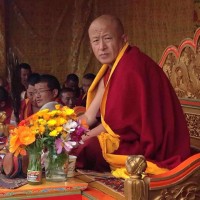We might still wonder, What is this enlightenment if it is not happiness or unhappiness? How does an enlightened being appear and function? How does it feel to discover our buddhanature? In Buddhist texts, when these questions are posed, the answer is usually that it’s beyond our conception, inexpressible. Many seem to have misunderstood this as a sly way of not answering the question. But actually that is the answer. Our logic, language, and symbols are so limited, we cannot even fully express something so mundane as the sense of relief; words are inadequate to fully transmit the total experience of relief to another person. If even quantum physicists find it difficult to find words to express their theories, then how can we expect to find a vocabulary for enlightenment? While we are caught in our current state, where only a limited amount of logic and language is used and where emotions still grip us, we can only imagine what it is like to be enlightened. But sometimes, with diligence and inferential logic, we can get a good approximation, just as when you see smoke coming from a mountain peak, you can make a calculated guess that there is a fire. Using what we have, we can begin to see and accept that obscurations are due to causes and conditions that can be manipulated and ultimately cleansed. Imagining the absence of our defiled emotions and negativity is the first step to understanding the nature of enlightenment.

Dzongsar Khyentse Rinpoche
from the book What Makes You Not a Buddhist
Read a random quote or see all quotes by Dzongsar Khyentse Rinpoche.
Further quotes from the book What Makes You Not a Buddhist:
- Driven by ambitions
- Shielding ourselves and others from the truth
- Pride and pity
- Not a buddha yet
- Bound by practicality
- Corrosion begins as soon as creation begins
- What is life?
- Like a child at the cinema
- Fearlessness
- Change is inevitable
- Where will they scatter my ashes
- Being a Buddhist
- Pride and pity
- Eventually we are disappointed
- Our true nature is like a wineglass
- The cup that holds the teachings
- Enlightened beings may seem insane
- Happily ever after
- The habit of self